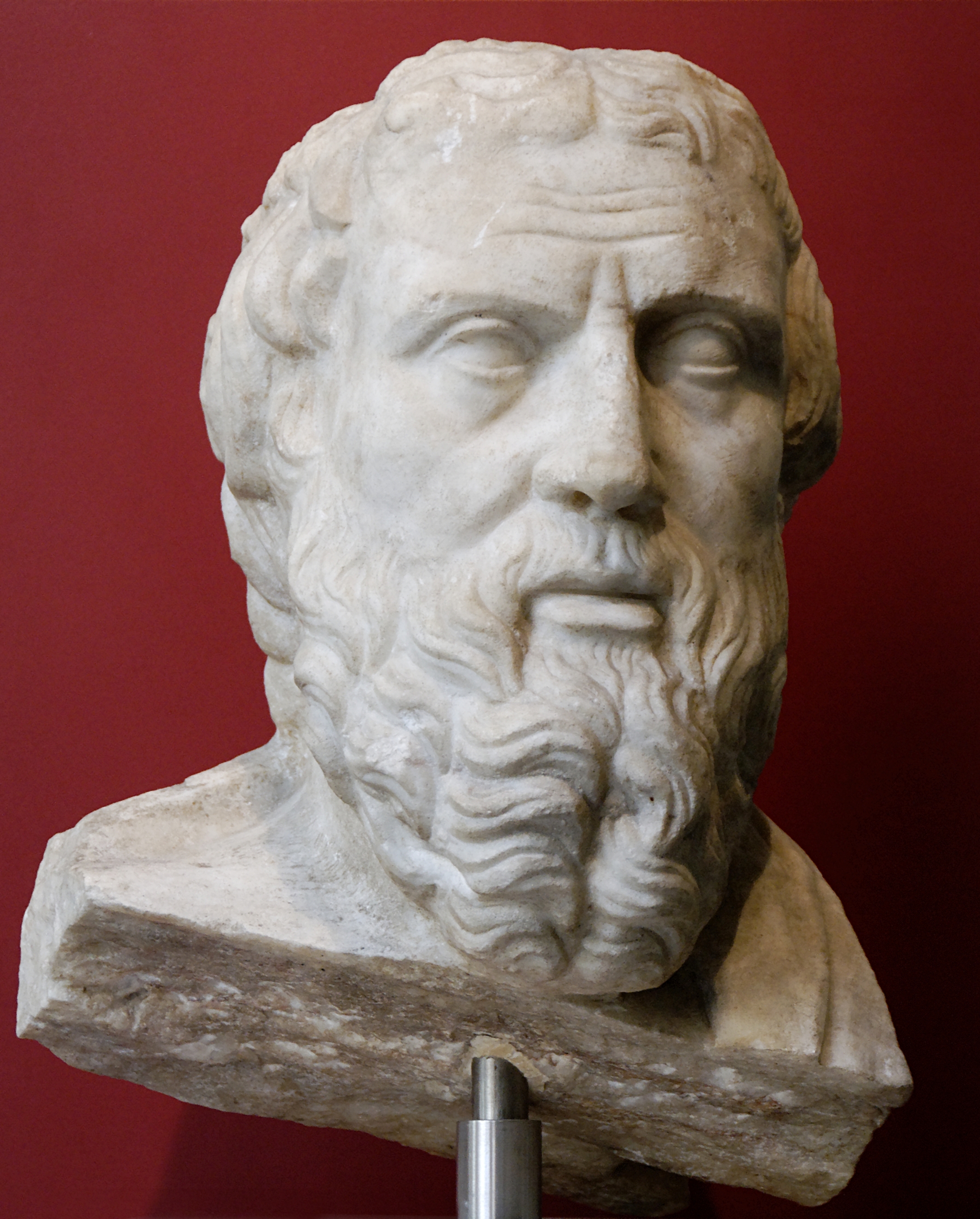Heródoto Frases famosas
“Na paz os filhos enterram seus pais, na guerra os pais enterram seus filhos.”
Heródoto citado in: A marinha d'outr'ora: (Subsidios para a historia). - Página 413, Affonso Celso de Assis Figueiredo Ouro Preto (Visconde de) - D. de Magalhães, 1894
Variante: Se um homem insistisse em ser sempre sério, não se concedendo nunca um momento de brincadeira e de relaxação, ou adoeceria ou se tornaria instável sem o saber.
Sobre a batalha de Termópilas
Revista Superinteressante nº 238
Citações de homens de Heródoto
Heródoto frases e citações
“São as circunstâncias que governam o homem, não os homens que governam as circunstâncias.”
Variante: São as circunstâncias que governam os homens, não os homens que governam as circunstâncias.
Heródoto: Frases em inglês
This statement is not to be found in the works of Herodotus. It appears in the acknowledgements to Mark Twain's A Horse's Tale (1907) preceded by the words "Herodotus says", but Twain was simply summarizing what he took to be Herodotus' attitude to historiography.
Misattributed
“The only good is knowledge, and the only evil is ignorance.”
The words of Socrates, as quoted by Diogenes Laertius.
Misattributed
Book 8, Ch. 98
variant: Not snow, no, nor rain, nor heat, nor night keeps them from accomplishing their appointed courses with all speed. (Book 8, Ch. 98)
Paraphrase: "Neither snow, nor rain, nor heat, nor gloom of night stays these couriers from the swift completion of their appointed rounds" ”
Appears carved over entrance to Central Post Office building in New York City.
The Histories
“This is the bitterest pain among men, to have much knowledge but no power.”
Book 9, Ch. 16
Variant translations:
Of all men's miseries the bitterest is this: to know so much and to have control over nothing.
The most hateful torment for men is to have knowledge of everything but power over nothing.
The Histories
“Call no man happy till he dies.”
Herodotus actually attributes this to Solon in a conversation with King Crœsus.
Variants:
Deem no man happy, until he passes the end of his life without suffering grief
Many very wealthy men are not happy, while many who have but a moderate living are fortunate; and in truth the very rich man who is not happy has two advantages only as compared with the poor man who is fortunate, whereas this latter has many as compared with the rich man who is not happy. The rich man is able better to fulfil his desire, and also to endure a great calamity if it fall upon him; whereas the other has advantage over him in these things which follow: — he is not indeed able equally with the rich man to endure a calamity or to fulfil his desire, but these his good fortune keeps away from him, while he is sound of limb, free from disease, untouched by suffering, the father of fair children and himself of comely form; and if in addition to this he shall end his life well, he is worthy to be called that which thou seekest, namely a happy man; but before he comes to his end it is well to hold back and not to call him yet happy but only fortunate. Now to possess all these things together is impossible for one who is mere man, just as no single land suffices to supply all things for itself, but one thing it has and another it lacks, and the land that has the greatest number of things is the best: so also in the case of a man, no single person is complete in himself, for one thing he has and another he lacks; but whosoever of men continues to the end in possession of the greatest number of these things and then has a gracious ending of his life, he is by me accounted worthy, O king, to receive this name.
The History of Herodotus Book I, Chapter 32 http://www.sacred-texts.com/cla/hh/hh1030.htm.
Misattributed
“I know that human happiness never remains long in the same place.”
Book 1, Ch.5.
The Histories
“In peace sons bury fathers, but in war fathers bury sons.”
Variant translation: In peace, children inter their parents; war violates the order of nature and causes parents to inter their children.
Book 1, Ch. 87.
The Histories
“I am bound to tell what I am told, but not in every case to believe it.”
Book 7, Ch. 152.
The Histories
“Great deeds are usually wrought at great risks.”
Book 7, Ch. 50.
The Histories
“Knowledge may give weight, but accomplishments give lustre, and many more people see than weigh.”
Actually a quotation from a letter of Lord Chesterfield dated May 8, 1750.
Misattributed
“Stranger, tell the people of Lacedaemon
That we who lie here obeyed their commands.”
Book 7, Ch. 228.
The Histories
“The king's might is greater than human, and his arm is very long.”
Book 8, Ch. 140.
The Histories
Book 1, Ch. 56; as translated in The Histories (1998) by Robin Waterfield and Carolyn Dewald http://books.google.com/books?id=Or5CKl1ObX4C&pg=PA24 pp. 23-24 ISBN 0192824252, 9780192824257
The Histories
Book 7, Ch. 50 (trans. George Rawlinson)
Variant translation: It is better by noble boldness to run the risk of being subject to half of the evils we anticipate than to remain in cowardly listlessness for fear of what might happen.
The Histories
“It is better to be envied than pitied.”
Book 3, Ch. 52
The Histories
Variante: How much better a thing it is to be envied than to be pitied.
“Force has no place where there is need of skill.”
Book 3, Ch. 127.
The Histories
“From great wrongdoing there are great punishments from the gods.”
Book 2, Ch. 120.
The Histories
“My men have turned into women and my women into men!”
Book 8, Ch. 98.
The Histories
